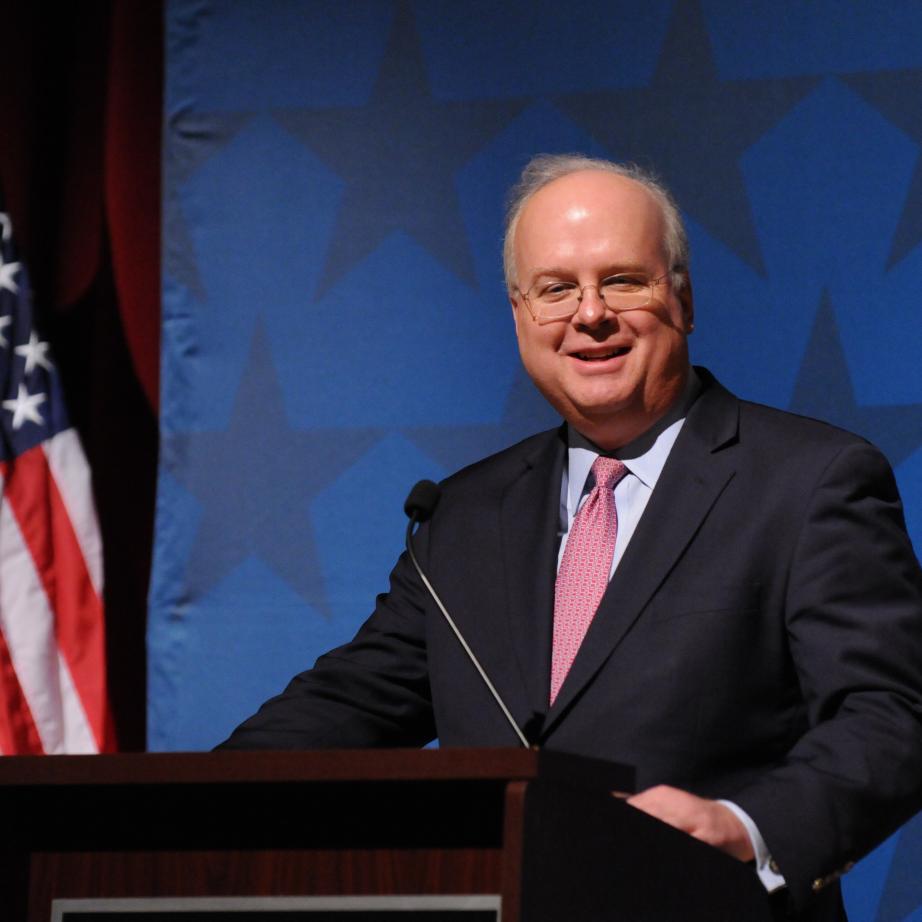Thursday, Apr 12, 2012
More than 500 people of varied political stripes turned out to hear Republican strategist Karl Rove’s thoughts on the 2012 presidential election. Rove was a guest of Rider’s Rebovich Institute for New Jersey Politics.
by Sean Ramsden
Though he successfully shepherded two presidential campaigns for George W. Bush, top Republican strategist Karl Rove says he’s given some bad political advice, too. He recalled a time in July 2000 when he was one of just six people in the entire world who knew that Bush, then the governor of Texas, favored Dick Cheney as his running mate against the soon-to-be-chosen Democratic ticket of Vice President Al Gore and Sen. Joe Lieberman.
After spending hours explaining to Bush why Cheney would hurt his campaign more than help it, Rove received a call the next day from the eventual 43rd president of the United States, who thanked him.
“He said, ‘You’re absolutely right about everything you said,’” recalled Rove, who had told Bush that voters would associate Cheney too closely with his father, President George H.W. Bush, for whom Cheney served as secretary of defense. He also explained that the three Electoral College votes that would come with Cheney’s home state of Wyoming wouldn’t tip the scales in Bush’s favor. “And then he told me that he was still going to run with Dick Cheney. And together, they won twice, so it looks like he was right.”
Rove, who went on to serve as senior adviser to Bush until 2007, including two years as his deputy chief of staff, shared this and other insights as a guest of Rider’s Rebovich Institute for New Jersey Politics on April 2 in the Bart Luedeke Center Theater. More than 500 people of varied political stripes turned out to hear the architect of Bush’s two successful runs for the Oval Office give his thoughts on the 2012 election.
A night before Mitt Romney would essentially put the clamps on the Republican nomination by sweeping primaries in Wisconsin, Maryland and Washington, D.C., Rove said wins there by the former Massachusetts governor would essentially bring a “volatile” primary season to an end – but not before a spectacle he says he is unlikely to forget.
“It’s an interesting time to be alive if you are interesting in politics. This is the wildest primary I’ve ever seen,” said Rove, who added that he was acquainted with the ugly 2000 GOP race at a very intimate level. “I’ve never seen such volatility. If you look at the polls – and sometimes polls are a substitute for good judgment – we’ve seen six different candidates lead the field 10 different times. The only constant is inconsistency.”
Romney’s top challenger, former U.S. Sen. Rick Santorum of Pennsylvania, suspended his campaign on April 10.
For as bruised as Romney may emerge from the primary, Rove believes that the former head of Bain Capital can and will be a formidable challenger to President Barack Obama.
“This is going to be an unbelievably tight, hard-fought election,” Rove said. “The president is not in a position to put it away.”
Citing numbers like Obama’s 44 percent approval rating in a daily tracking poll and a Gallup poll claiming just 26 percent say they are satisfied with the president’s performance, Rove said the figures don’t augur well for his reelection. “There has never been anyone that low who was reelected,” he said of the Gallup poll.
Rove said that in the case of those seeking change from Obama, it is nothing personal, but rather, simply business.
“It’s not because people don’t like him. We look at his picture and say, ‘there’s something good about that,’ Rove explained, referencing a combination of the president’s personal appeal and the pride Americans feel in having elected their first African-American president. “We like him, but are terribly disappointed with what he’s done in office.”
Obama’s poor approval ratings on such essential issues as the economy portend poorly for him, as well, according to Rove.
“You can’t run for reelection with bad numbers on basic issues,” he said.
Rove spent considerable time illustrating how the Affordable Care Act – perhaps the signature accomplishment of the president’s first term – will prove detrimental to his prospects for a second.
“The Affordable Care Act is the only piece of social legislation that has become less popular after it’s been passed,” Rove said. “The 1964 Civil Rights Acts was far more popular even months and years later after its widespread initial unpopularity in the South.”
The widespread opposition to the Affordable Care Act among physicians reported by poll numbers, combined with the deleterious fiscal effect of the legislation projected by many economists, and rising costs for consumers add up to gloom for Obama’s reelection hopes, according to Rove.
“This has left us with a president unable to go back to the country and say, ‘look at the great job I’ve done,’” Rove explained.
With both candidates – Obama, the incumbent, and Romney, the presumptive Republican nominee – providing their opponents a good deal of campaign fodder, Rove says the real battle for the White House will be waged in a small number of swing states, including Ohio and Florida, which voted Republican in 2004, but Democratic in 2008. Combined, those two states account for 98 Electoral College votes.
More locally, Rove said Pennsylvania also falls into this category of key swing states. As such, he warned South Jerseyans and Keystone Staters in the audience to brace themselves for an onslaught of campaign commercials for both parties.
“Let me apologize now to those of you who live in the Philadelphia market,” he said. “Philadelphia is going to be bombed with television ads.”

